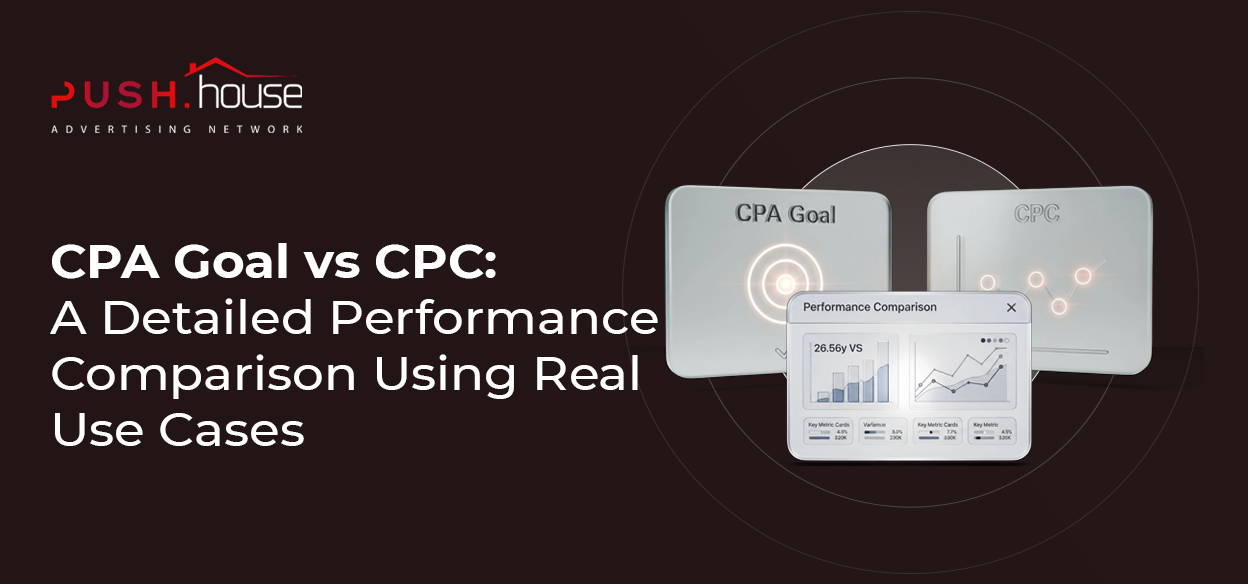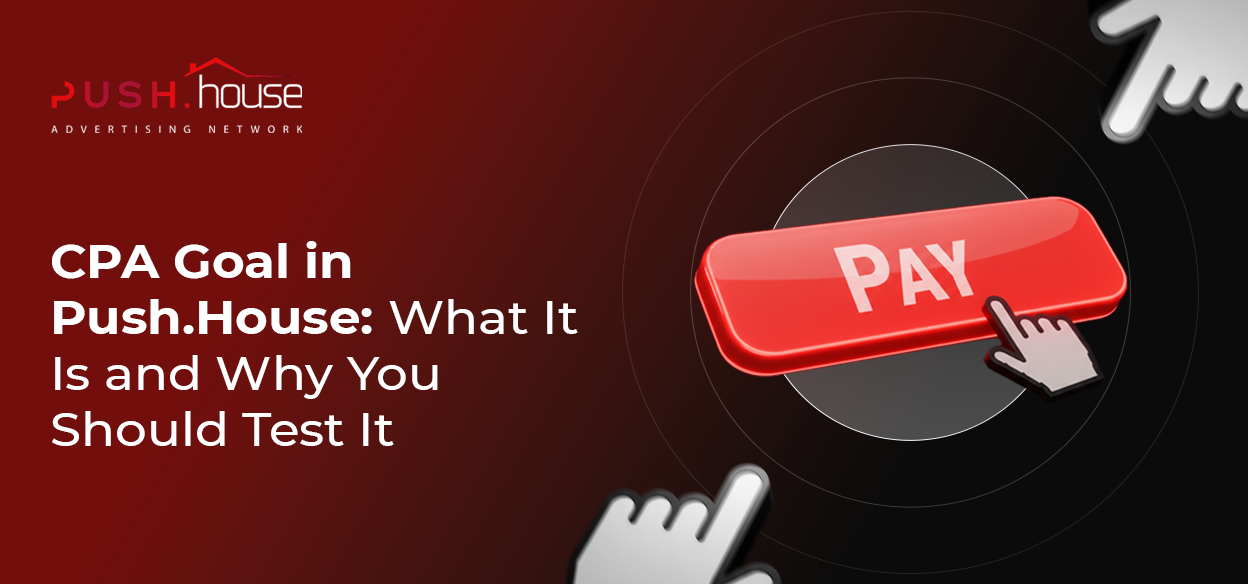
Affiliate Marketing Glossary of Terms by Push.House
Hello! This is Push.House.
Affiliate marketing is a separate universe with a huge number of professional terms that require explanation and understanding. To keep you from getting lost among the abundance of material, we’ve prepared a special affiliate vocabulary. Use it with pleasure and save it so you won’t lose it!
A
Acct – an abbreviation for “account.”
Ad Format – visual method of interacting with a target audience.
Ad set – a group of advertisements.
Adult – an offer vertical for 18+, encompassing anything related to sex:
- Porn sites
- Webcam services
- 18+ games
- Sex toys
- Enhancers and stimulants
Advertiser – a specialist attracting traffic to offers for payouts.
Advertiser – a specialist promoting offers by placing advertisements in traffic sources.
Advertising Campaign – a series of actions in an advertising network aimed at attracting traffic to an offer.
Advertising Network – a platform for ad placement.
Affiliate Link – a link to the offer’s landing page.
Affiliate link (stream) – a link through which a webmaster directs traffic to an affiliate network offer.
Affiliate Marketing (CPA Marketing) – a popular internet marketing model based on mutually beneficial cooperation between the product owner, advertiser, and consumer. The product owner gains sales, the advertiser receives a payout, and the customer gets a product fulfilling their needs or desires.
Affiliate Network – a platform with offers.
Affiliate Program – a cooperation model between an advertiser and an offer owner.
API (Application Programming Interface) – protocol for computer program interaction allowing one application’s functions to be used within another’s functionality.
App Installs – the vertical of software offers, applications, and browser extensions.
Approval Guarantee – a guaranteed percentage of confirmed leads.
Approval Percentage – the percentage of leads approved by the affiliate network.
Approve – Confirmation/Approval.
Approve (in statistics) – an indicator showing the number of successful targeted actions out of the total number of inquiries. For instance, if there were 10 inquiries for an offer but only two resulted in a purchase, the approval would be 20%.
AR (Approval Rate) – virality indicator (speed of content dissemination by users).
Average bill – The average order value
B
Backlink – An inbound link leading to a promoted website from other resources.
Banner – a graphic advertisement placed on a website, which can be either animated or static.
Banner Blindness – feature of user behavior where site visitors ignore presented advertisements.
Betting – the vertical of bookmakers and totalizators.
Bid – the maximum amount an advertiser is willing to pay for displaying an advertisement on a platform. The bid differs from the average cost per click and can be either significantly higher or lower than this value.
Bidding – a bid management system in PPC advertising.
Blacklist – a list of platforms where advertising doesn’t yield desired results. Compiled manually by advertisers.
Bot – a specialized program executing specific actions.
BR (Bounce Rate) – indicator of the frequency of closing a page immediately after landing on it.
C
Campaign Limit – the maximum amount that can be spent on advertising per day.
Case – an example of an advertising campaign described as a sequence of specific actions.
Click – a visitor’s action of interacting with an advertisement.
Click Fraud – fraudulent actions aimed at increasing competitors’ ad budget expenses by inflating the number of clicks using bots.
Click-Throughs – the total number of users who clicked on an advertisement.
Clickunder – a popular ad format where a page opens in a new tab upon clicking any part of the screen.
Cloaking – a specialized technology for content substitution necessary to pass moderation in traffic sources with a strict anti-fraud system. It divides visitors into two ways: moderators redirected to a white page, while users go to the offer’s landing page.
Content Marketing – advertising offers through useful and interesting content to the target audience (posts, blogs, articles, etc.).
Contextual Advertising – advertising in search engines and search engine partner sites. Selected based on user preferences, search queries, and GEO location.
Cookies – files storing detailed information about all user actions on websites and in search engines.
COS (Cost of Sale) – cost of one transaction.
CPA (Cost Per Action) – the most popular payment model where the advertiser receives a one-time payout after a user completes a specific target action (payment, registration, deposit, etc.).
CPA models:
- CPL (Cost Per Lead) – payout for a lead. In affiliate marketing, a lead refers to a user’s contact information provided for order processing. Under the CPL model, the advertiser receives payment after the user fills out a form on the website or registers. There are two variations of the CPL model:
- SOI (Single Opt-In) – payout after filling out the registration form.
- DOI (Double Opt-In) – payout after filling out the registration form and confirming via email.
- CPI (Cost Per Install)** – payout for installation. Under the CPI model, the advertiser receives payment after the user downloads and installs software, a game, or any other application on their device.
- CPS (Cost Per Sale) – payout for a sale. In the CPS model, the advertiser receives payment after the user makes a purchase of a product or service. It is one of the most expensive payment models, and payout to the advertiser occurs after the order is paid. It has the longest payout hold.
- CPV (Cost per Visit) – payout for website visits. A less popular model where the advertiser receives payment after the user visits the offer owner’s website. Payments under this model are considered some of the lowest in the market.
- CPC (Cost Per Click) – cost of a single unique click. Calculated using the formula:
- CPC = Spend / Clicks
CPM (Cost Per Mille) – cost for a thousand impressions. Calculated using the formula:
o CPM = (Spend / Impressions) x 1000
CR (Conversion Rate) – conversion rate coefficient determining the ratio of the total number of leads to the total number of clicks. Expressed as a percentage and calculated using the formula:
o CR = (Total Leads / Total Clicks) x 100%
Creative – an advertisement consisting of a headline, image, video, or gif, encouraging users to navigate to the landing page.
Cross-sell – upselling related products.
CTA (Call to Action) – direct appeal to perform a targeted action (click, buy, register, download, etc.).
CTR (Click-Through Rate) – clickability indicator. Calculated using the formula:
o CTR = (Clicks / Impressions) x 100%
D
Dating – the vertical of services and applications for dating.
Domain Parking – registering a domain name on the DNS servers of an affiliate network for subsequent placement of landing pages.
Doorway – a site optimized for one or several search queries to boost the platform in the general search results. Upon access, users are redirected to the target page, e.g., a landing or pre-landing pages.
E
EPC (Earnings Per Click) – Indicator of average earnings from an offer per click. Calculated using the formula:
o EPC = Revenue / Clicks
ER (Engagement Rate) – user engagement rate. Calculated using the formula:
o ER = (Number of Completed Target Actions / Number of Views) x 100%
F
Farmer – specialist preparing accounts for advertising launch.
Farming – account preparation for launching advertising campaigns in a traffic source by simulating active profile usage.
Feed – a universal multi-vertical feed comprising multiple products. In this case, traffic is attracted not to specific products, but to a platform where all products are presented. Payout is credited if a user submits an inquiry for at least one of the offers.
Finance – vertical of banks, microfinance organizations and cryptocurrencies.
Fraud – fraudulent actions aimed at deceiving an affiliate network.
G
Gambling – the vertical of offers related to gambling and casinos.
GEO (Geographical Location) – term indicating the region or country for promotion.
Goods – vertical of general consumer goods, including:
- clothing,
- electronics,
- toys,
- sporting goods,
- household items,
- gardening supplies.
H
Hold – the period for checking traffic by the affiliate network.
Hosting – service providing resources for storing and hosting information on a server.
Contact the Push.House manager to get started
I
Impression – a metric indicating how many times an ad has been shown to a user.
In-app traffic – traffic from mobile applications.
In-Page Push – a unique advertising format combining banner advertising and push notifications, not requiring user permission to receive the newsletter.
Insta – the social network Instagram (abbreviation).
Install – the installation of an application.
International market (CIS Slang) – a collective term referring to the foreign internet market.
K
KPI (Key Performance Indicator) – a quantitative result of an advertising campaign or marketing strategy.
L
Landing Page – a single-page website dedicated to a promoted offer, containing detailed descriptions of its features and advantages, along with a direct call to action.
Lead – a potential customer who has provided their contact information for follow-up or completed a desired action (registration, purchase, download, etc.).
Locker – an instrument restricting the user interface on a website until they perform a desired action (send an SMS, register, download a file, etc.).
M
Macros – special commands for gathering data about users and advertising campaigns.
Mislead – actions that mislead users; for instance, an advertisement displaying a 50% discount but offering only 10% on the landing page.
Mobile Traffic – traffic from mobile devices.
Monetization – earning through user visits to a web resource.
Motivated Traffic – users who perform a targeted action in exchange for some form of reward. A prohibited form of traffic.
N
Native Ads – a unique advertising format based on drawing attention by mentioning a product in the context of the main content. It’s perceived as part of the content.
News Feed – a news site with numerous advertisements in various formats (banners, video creatives, etc.).
Nutra – a vertical of health and beauty products, including:
- dietary supplements
- joint pain remedies
- nail fungus treatments
- weight loss capsules/tablets
- creams for rejuvenation and beauty.
O
Offer – a promotional offer of a product or service for which an advertiser receives payout for advertising it.
Optimization – a set of specific actions aimed at improving marketing performance and increasing the efficiency of an advertising campaign.
P
PIN-Submit – a vertical of mobile subscription offers (horoscopes, jokes, weather forecasts, etc.). Payment occurs via mobile phone balance after SMS confirmation.
Pixel – a special tool for collecting data about the audience visiting the “Thank You” page or the offer’s landing page.
Pop-Up – a front-facing window with an advertisement that appears when a targeted action is completed on a website.
Popunders – ad format presenting an offer in a pop-under window, opening in a new tab.
Postback – a tool for transferring information about targeted actions from an affiliate network to a tracker or ad network.
Postback URL – a link for transmitting data about conversions.
PPC (Pay Per Click) – advertising payment model where the advertiser pays for each user click in the advertising network.
PPL (Pay Per Lead) – advertising payment model where the advertiser pays for each user registration.
PPV (Pay Per View) – advertising payment model where the advertiser pays for each viewing of advertising material by the user.
Pre-Landing – a transitional website motivating users to perform a target action. It provides information about the offer and maximally stir up users interest before directing them to the landing page.
Profit – a profit ratio from advertising. Formula:
- Profit = Revenue – Expenses.
Prohibited Traffic – traffic banned within the cooperation between an advertiser and an affiliate network (spam, misleading, motivated).
Proxy Server – a server that substitutes the IP address of a client’s device.
Publisher – a website owner.
Push Notification (push) – a small pop-up advertisement on a page.
Q
Quality Traffic – traffic interested in purchasing a product or service.
R
Re-monetization – the re-monetization of traffic that didn’t complete the target action on the offer’s landing page initially, often achieved by redirecting traffic to a feed.
Reach – the number of users who have seen the advertising offer.
Redirect – a program or script that forcibly redirects a user from a website to a landing page.
Referral – a user who registered on a website or service through a referral link.
Referral Link – an affiliate link for attracting new users to a product or service. For example, attracting new advertisers to cooperate with the affiliate network.
Resellers – affiliate networks offering other owners’ offers for advertising.
Retargeting – a tool that allows the re-display of ads to users who previously showed interest in an offer.
Revshare (Revenue Share) – popular payment model where the advertiser receives a percentage from attracted users as long as they use the offer. This payment model is most advantageous for advertising offers that involve long-term use, such as gambling, betting, etc.
ROI (Return on Investment) – indicator of investment profitability, allowing the determination of the profitability or loss of an advertising campaign. Calculated using the formula:
o ROI = (Revenue – Spend) / Spend x 100%
Run Ads – to launch an advertising campaign to attract traffic to an offer.
S
Scheme (setup)- a way incorporating all necessary elements for attracting traffic (landing pages, creatives, ad campaign settings, etc.).
Search Engine Optimization (SEO) – actions aimed at improving a website’s ranking in search results.
Search Traffic – users who arrive at a landing page through search engines.
Semantic Core of the Site – a set of words and key phrases used to improve a site’s ranking in search engine results.
Shave – deliberate deception of the advertiser by an affiliate network, such as hiding successful conversions and leads.
Sign up – to register.
Smartlink – a link that selects the most relevant offer for a specific user based on the GEO from which the redirect was made.
SMM (Social Media Marketing) – a type of internet marketing in social networks.
Spam – mass distribution of advertising messages without the recipient’s consent.
Spend – the amount spent on displaying advertisements.
Split Test (A/B Testing) – a method for evaluating the effectiveness of replacing a specific element in a scheme while keeping others unchanged.
Spy Service (Spy) – a platform for monitoring competitors’ advertising.
Statistics – advertising campaign statistics.
SubID – a tool allowing detailed tracking of statistics by collecting information about user actions on the page.
Sweepstakes – vertical with offers related to lotteries and giveaways.
T
Target Action – action that a user must complete for the affiliate network to pay the advertiser a payout.
Target Action – user reaction carrying real benefits, such as clicking a link, purchasing a product, or subscribing to a newsletter.
Target Audience – a group of users in need of what is advertised in an offer or who might potentially be interested in it.
Targeting – a method of selecting a target audience based on settings like geographical location, age, subscription age, device, and other variables defining users.
Teaser – provocative advertisement comprising an image (static, video, or GIF) and text.
Teaser Traffic – users interested in provocative teaser advertisements.
Tracker – tool for tracking and analyzing traffic.
Traffic – users who visit a site.
Traffic Source – websites, platforms, and advertising or social networks where offers are promoted.
Trash – incorrectly filled out application.
Trust – the level of trust.
U
Upsale – up-selling additional products by call center specialists. For instance, a customer inquires about buying one package of a weight loss product and is offered to purchase a whole course at a more favorable price.
V
Vertical (Niche) – a category of offers within a specific theme.
VPK (Visits per keyword) – indicator of the frequency of transitions from search engines for a specific keyword.
W
WAP (Wap Click) – vertical of offers involving subscriptions. Payment occurs from the mobile phone balance.
Web Push – classic push notifications by subscription.
Webmaster – an individual or company promoting offers in order to receive payouts.
Weight Loss Offers – nutra offers for weight loss.
White page – a website complying with ad network rules. Necessary for advertising through sources with stringent moderation to pass anti-fraud checks.
Whitelist – a list of priority advertising platforms where ads are displayed. Compiled manually by advertisers.











